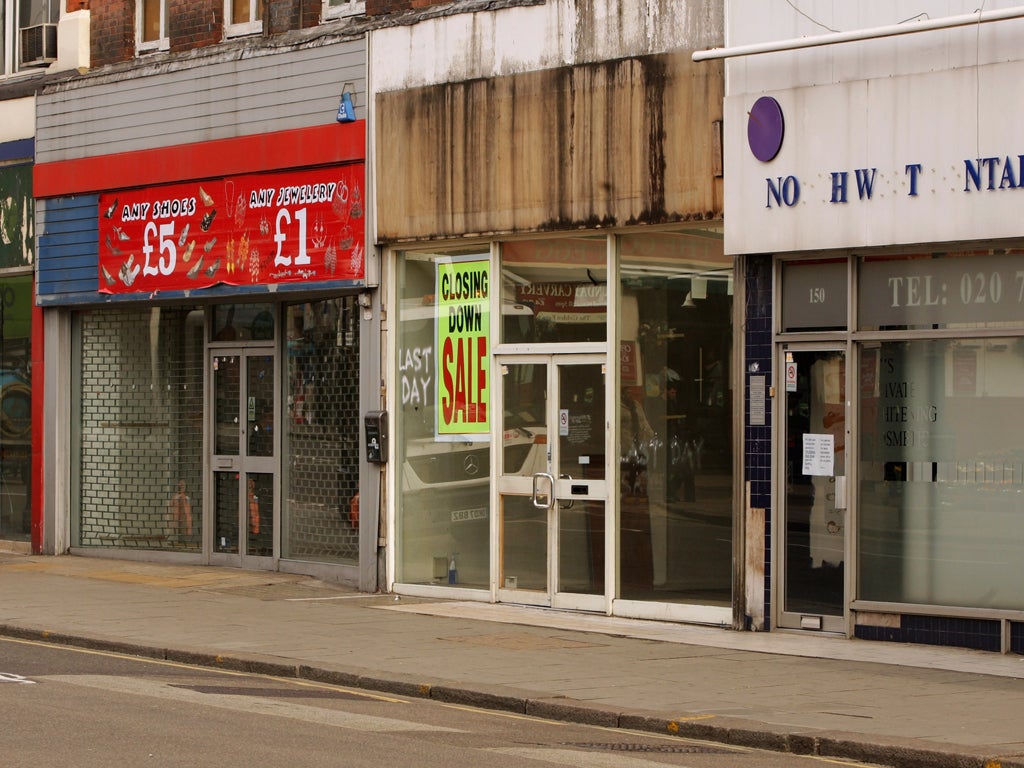Our need for human contact will save high streets
Those who argue that most people would be happy with a once-weekly visit to an out-of-town hypermarket misunderstand the significance of shops in human relations

It is doom time on the high street once again. A new report has suggested that the whole idea of shops at the centre of towns may be out of date. A walk down what was once a street once thronging with retail activity will now, it is said, have little more than a bookmaker, a pawnbroker, a nail-bar, an estate agents and perhaps a couple of charity shops – as perfect a vision of the failure of 20th-century capitalism as one could wish for.
The Government's cynical stunt of setting a TV personality to work on the problem will be in the spotlight this week with the appearance of Mary Portas before the Communities and Local Government Select Committee.
Her progress report is unlikely to be encouraging. The Local Government minister Eric Pickles has added to this confection of hot air and bad policy by setting up a new quango, the Future High Street Forum, and announcing that a team of experts will be sent to the 326 towns which have received small amounts of government money under the Portas scheme to show them how to spend it. A high street tsar cannot be far away.
All this silliness and inaction matters more than one might think. Healthy town centres are more than economic indicators; they are socially important. Shopping is part of life. Those who argue that most people would be happy with a once-weekly visit to an out-of-town hypermarket misunderstand the significance of shops and the various community centres in the way we relate to one another as citizens.
Buying exclusively online or through a supermarket reduces us. We become less human, more an economic unit.
What is particularly enraging about the Government's position is that the greatest problem faced by high-street retailers has been created by Whitehall. Business rates are absurdly high, having been established in 2008 at the peak of the property boom. The next re-evaluation was due in 2015 but, no doubt thanks to a nudge from the Treasury, the Government has delayed the date until 2017.
Meanwhile, rates are rising rapidly. Because they are based on the retail price index, they went up by 4.6 per cent in 2011 and a further 5.6 per cent in 2012. In other words, competition between shops and online retailers is becoming more unfair by the day. The perfectly sensible idea of rewarding businesses who use premises which have been empty for a year, employed by the Welsh government, has apparently been rejected.
Yet the more the internet and big business dominate our lives, the more urgent the need for community. High streets may have to change, shifting the emphasis towards services which cannot be provided elsewhere –cafes, libraries, social enterprises – but there is clear evidence that, socially if not economically, they are still needed.
The old Conservative approach, which judges a high street business exclusively on how much money it generates, will have to give way to something more civic and cohesive, and there are signs that the change is happening already. Quietly and unobtrusively, the places where people meet and work together for the community rather than for profit are re-establishing themselves in the centres of towns. The kind of social enterprises which have much been mocked in the past, when they were in the limp, nannyist grip of Labour councils, are being set up by local people and, just occasionally, supported by their local councils.
In this context, Birmingham's spectacular new library, opened today, is not the last exhausted gasp of civic Britain but a look to the future.
With fewer silly initiatives, a fairer system of business rates, and support for projects which involve, motivate, train and entertain local people, our revived high streets could bring life, hope and colour back to the centres of our towns.
What was Fred the Shred thinking of?
He was the boss who insisted on being in charge of Christmas cards. He obsessed over colours in advertisements and computer systems. He ordered all flat-top storage cabinets to be replaced with those with a rounded top to avoid staff leaving anything on top of them. He insisted that the fleet of chauffeur-driven Mercedes S-class cars should be exactly the same blue as his company's corporate image and that the leather interiors matched the carpets in the management offices.
Who was this jackass? None other than Sir Fred Goodwin, pal of Gordon Brown, once knight of the realm and one of the most powerful bankers in the world, the man who devastated the Royal Bank of Scotland and significantly contributed to the global banking crisis, affecting the lives of millions.
To judge by the alarming, depressing portrait of Goodwin provided by Iain Martin's forthcoming biography, power and money not only corrupt a person's morals but also his brain. The more he is paid, the sillier he gets.
www.terenceblacker.com

Join our commenting forum
Join thought-provoking conversations, follow other Independent readers and see their replies